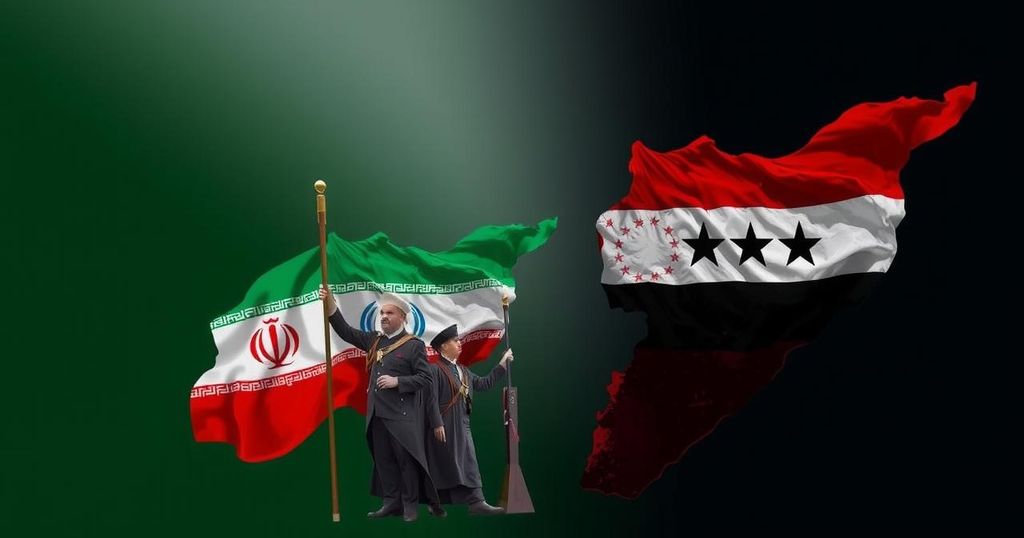Iran’s Struggles to Support Assad Regime Amidst Regional Setbacks
Iran is struggling to support the Assad regime in Syria as its proxies weaken, particularly after recent territorial gains by opposition forces such as Hayat Tahrir al-Sham (HTS). The Iranian regime has admitted that setbacks pose a challenge to its ‘axis of resistance,’ which includes several militant groups actively engaged in conflict against Israel. With Hezbollah and other proxies severely compromised, Iran faces a precarious situation and may need to reevaluate its strategic alliances to stabilize the Assad regime.
Iran is currently confronted with significant challenges in supporting the Assad regime in Syria. The Iranian regime has acknowledged setbacks to its “axis of resistance,” which includes groups such as Hezbollah, Hamas, the Houthis, and militias from Iraq, Syria, and Lebanon. The challenges have manifested as opposition forces, particularly Hayat Tahrir al-Sham (HTS), have gained territorial control, undermining the regime’s authority. As attacks on Israel by its proxies have intensified since the Hamas assault on October 7, the coordinated timing of these setbacks is raising concerns within Iran regarding external influences orchestrating these developments.
Iranian Chief of Staff Major General Mohammad Bagheri’s recent communications with military leaders including those of Russia and Iraq reflect Iran’s urgent attempts to solidify support for the beleaguered Assad regime. Reports indicate that Iranian officials are wrestling with both the resurgence of terrorism in Syria and the demands of their proxies, whose effectiveness has waned under intense conflict. Hezbollah, notably weakened after heavy fighting with Israel, is unable to offer substantial help, thereby worsening Iran’s predicament in Syria.
The Iranian armed forces seem to be experiencing a dual crisis: on one hand, they face internal fractures within their allied proxy groups; on the other, they grapple with external military pressures. The Syrian Democratic Forces (SDF), backed by the United States, are actively engaged in clashes with Syrian regime forces, further complicating Iran’s ability to maintain a stable foothold in the region. Compounding these issues is the difficulty of deploying Iranian troops, as Tehran prefers its proxies to bear the brunt of conflict.
In light of these challenges, reports surfaced regarding the potential deployment of Javad Ghaffari, a high-ranking member of the Iranian Revolutionary Guard Corps (IRGC), to Syria to aid in the ongoing conflict against HTS. Although the authenticity of these reports remains unverifiable, it signals Iran’s increasingly desperate measures to salvage the Assad regime amid a dire situation. Given the limited military resources available to Assad, Iran may seek unconventional strategies, including potential negotiations with Turkey to mitigate HTS’s recent gains.
The geopolitical landscape in Syria has long been defined by the involvement of multiple actors and alliances. Iran’s support for the Assad regime has been functionally integral to maintaining the Syrian government’s power against various rebel factions. This support is often channeled through a network of proxies, including Hezbollah in Lebanon, Shiite militias in Iraq, and other groups, collectively referred to as the “axis of resistance.” Recent developments in Syria, particularly the strengthened position of opposition groups like Hayat Tahrir al-Sham (HTS), have escalated tensions for Iran’s strategic objectives. These developments are exacerbated by the increased involvement of US-backed forces in the region, further complicating the already volatile situation for the Iranian regime and its allies.
In conclusion, Iran’s efforts to support the Assad regime in Syria face significant setbacks due to its weakened proxy forces and the resurgence of opposition groups like HTS. The Iranian military is striving to strengthen alliances with regional partners while confronting the reality of its limited military capacity. As the situation evolves, Tehran may need to reconsider its strategies, including fostering new negotiations with external actors, such as Turkey, to counter the growing threat posed by HTS and maintain its influence in the region.
Original Source: www.jpost.com




Post Comment